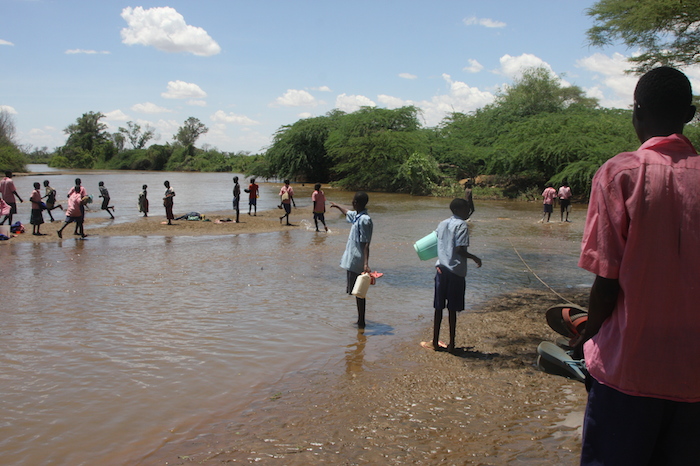
By Wesley Lang’at
The northern parts of Kenya, primarily inhabited by pastoralists, have for many years been prone to inter-communal resource conflict and cattle raids.
In the recent past, the situation has been aggravated by changes in rain patterns resulting in longer dry seasons thus inhibiting adequate and easy access of water and pasture.
According to a research done by Practical Action, 164,457 people fled their homes as a result of conflicts associated with fighting for diminishing water and pastures.
The reports further states that 70% of the displaced are women and children aged below 14 years.
It’s a hot sunny afternoon in Katilu village, Turkana South; parents are sitting under the shade waiting for their children to go fetch water at river Turkwel.
Due to unpredictable weather patterns and gradual change in climate resulting in longer dry seasons, Katilu village experiences water shortage thus forcing residents to walk five kilometers to Turkwel River, the only water source that serves the entire region. According to the June 2015 early warning report released by National Drought Management Authority (NDMA), the area experienced change in rain pattern which was below the normal 50 mm preceded by long droughts.
Consequently this has negatively impacted on the education system in the pastoralist area as students have been forced to abandon afternoon classes in pursuit of the scarce commodity. NDMA early warning report further indicated that, the average walking distance in search of water gradually increased from 5km to almost 7km daily.
“We have a lot of problems with water since last year but now it’s worse because we spend a lot of time looking for water rather than going to classes,” said one of the students.
The students are forced to walk long distance in pursuit of water despite the danger of being attacked by raiders.
“This place is so insecure. One of my student was shot dead by the raiders and since then parents, teachers and Kenya police reservists always accompany students to the river to fetch water, ”said Katilu Primary School deputy Head teacher Mathew Karing’a.
He added that the water conflict has impacted negatively on the population of the school as scarcity of water has forced some of the students to opt out of class in pursuit of water.
“In the past we had a population of 1036 pupils but now the number has immensely decreased, they are moving from Katilu to areas where they can get water and pastures, they are relocating to Kanawadong,” Karing’a said.
John Ekal, a resident of Katilu, said it was very disheartening as children are looking for water in dangerous places rather than being in class.
“In this school there are no afternoon classes; children spend most of their time looking for water seven kilometers away from school,” Ekal said.
Asked about the education status in his jurisdiction, Turkana South District Education Officer Dickson Ogwang confirmed that most of the schools in his area occasionally closed due to insecurity.
“I have seen the insecurity issue impacting very negatively on learning because sometimes it becomes intolerable and schools have to close, You know its becoming so hot and students don’t concentrate.” Ogwang added.
The ever rising insecurity and the lack of water forced some of the residents like Paul Ikenye to shift base to neighboring Uganda.
“We have taken all our livestock to our brothers in Matheniko, Uganda because there is peace, water and grasses. But here in Turkana there is no pasture and no peace,” Ikenye said.
It’s not only water and cattle rustling that makes Katilu area prone to insecurity, according to Catholic Diocese of Nakwamuru Turkana South priest Augustine Emathe unclear boundaries between the two warring communities contributes to the violence as they compete over the control of water points.
“Government should clearly demarcate boundaries between these people and increases security personnel in this area,” Emathe urged.











